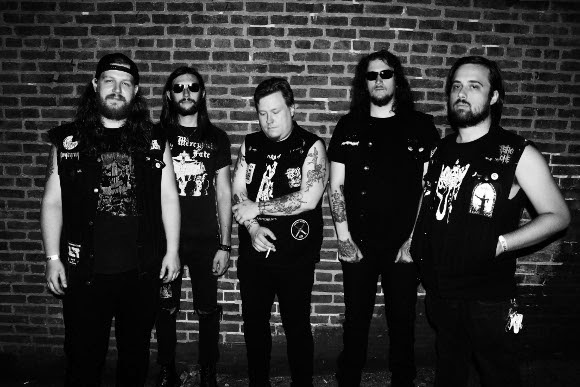A. Poole is a multi-instrumentalist who is responsible for some of the most forward thinking and innovative metal music today through projects such as Chaos Moon, Esoterica, and Lithotome. He recently released the latest Chaos Moon album Resurrection Extract via I, Voidhanger Records, which is a journey of blistering black metal bathed in dark psychedelic textures. I recently sent him some questions regarding the new album and his multitude of bands among a slew of other things. His music can be found at the following places: Chaos Moon, Esoterica, Lithotome. All three come with the highest recommendation possible, if you haven't heard them do so.
Horn of Woe: You abandoned
the Chaos Moon moniker in order to start playing as Esoterica, what led to the
creation of the new project? Did you see Esoterica as a continuation of what
you were doing in Chaos Moon?
A. Poole: I had a major block writing in the style
I wanted to write in for Chaos Moon. So, I approached writing in a new method
which resulted in the formation of Esoterica. At the time, it did seem like a
natural progression and I considered Chaos Moon dead, but something clicked and
I was able to articulate what I wanted for Chaos Moon.
AP: I “accidentally” wrote in the style of
Chaos Moon again. I couldn’t release it under the Esoterica name, because it
wasn’t the sound I was going for with that, so I had to bring it back from its
short coma. Reviving the project has been a fulfilling experience for me
because I was able to tap into something that I had been trying for years to
tap into again. I didn’t want to write an album of “Languor Into Echoes,
Beyond” tribute songs, I wanted to write something new, but from that same
“place.”
Resurrection Extract
AP: Lithotome came about during the writer’s
block time. I was experimenting with various tunings and the album wrote
itself.
HoW: You are
obviously extremely immersed in numerous forms of dark music, having been
involved in several bands for over ten years now. What first drew you to heavy
and dark music and what continues to drive your prolific output?
AP: I’ve always been attracted to darker or
“sad” music, even when I was a child. Music that made you really feel something.
I stumbled upon “In the Nightside Eclipse” by Emperor my first year of high
school and that did it for me. I immediately tried to write music like that and
haven’t stopped since. I’m addicted to recreating that feeling.
HoW: With several
projects you must dedicate an immense amount of time to the writing, I’m
interested in finding out more about your creative process. Do you keep each
project separate during creation or do you simply write and see where it fits best?
AP: I let the ideas come naturally. Sitting
down and forcing myself to write music 98% of the time ends in failure or
something down the road that needs a lot of work. I have to let the excitement
of creating hit me and then I can write music that is honest. It’s all about
conveying feelings or ideas, not writing like the band/style you’ve been
listening to a lot. Because of this and the amount of projects I’m involved in,
it’s easy to write a song after feeling inspired and sort it to the appropriate
project.
Esoterica
Live
AP: Lithotome’s lyrics are handled by Neill
Jameson, but the other two projects come from various places, but are still
pretty closely related. Chaos Moon is more personal, when I do write for it,
but this past release has lyrics from myself and a few other individuals while
still remaining thematically cohesive. Esoterica plays more into darker trains
of thought and relies more on concepts. My experience with various psychedelics
has played a huge part in the lyrical influence. Unlocking the mind yields
maximum results.
AP: My wife introduced me to Neill (Imperial)
a while I was still living in Nashville, TN. We became good friends, worked on
Lithotome together, and I finally moved up into the Philadelphia area. I was
pretty much forced into playing guitar for Krieg, which was a very unusual
experience being a fan of the band several years prior. I am the full time
studio/live guitarist and I assist with writing, arrangement, and recording
(when needed) duties.
Krieg
HoW: What’s next for you? Are you continuing forward with Chaos Moon once again or is it back to Esoterica? Will new Lithotome material ever surface?
AP: I’m currently writing for a new project
called Martröð with H.V. Lyngdal (Wormlust), MkM (Antaeus/Aosoth),
Thorns (Acherontas/Blut Aus Nord), and a few others. We’re finishing up a 7”
that will hopefully be out sometime later this year. Krieg’s full length we
recorded back in February will see a release in early September. Esoterica has
a mini-album called Lesser Sun that will be out later this year and will be the
final release of that project for a while. Lithotome is in limbo right now due
to a large number of issues, but I’m
sure that material will surface eventually.
HoW: Thank you for
answering my questions, anything else you would like to add?
AP: Thank you.





